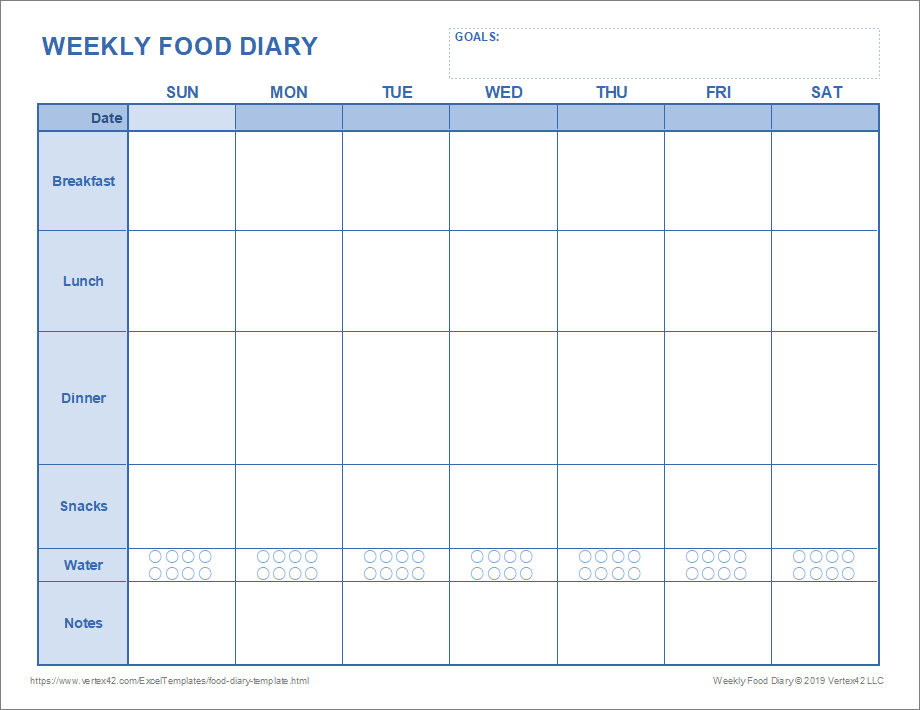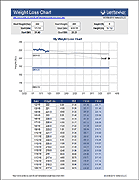Food Diary Template
A food diary, journal or log, allows you to record meals and drinks and track calories and macronutrients (protein, fat, carbs, etc.) on a daily basis. You typically set a daily calorie goal and use the food diary to help you meet that goal. There are many mobile apps designed for that purpose, but many people still like to use a simple printable food diary.
In addition to printing blank diary pages, you can use this spreadsheet in the Excel app on your smart phone. You only need to populate the food list with your favorite foods and drinks. Then, when you enter your daily meals, you simply select what you ate or drank from a drop-down list and enter the number of servings.
Printable Food Diary
If you don't have Excel, you can download the PDF below to print blank diary pages.
Food Diary Template
for Excel and Google SheetsDownload
⤓ Excel (.xlsx)Other Versions
License: Personal Use (not for distribution or resale)
"No installation, no macros - just a simple spreadsheet" - by Jon Wittwer and Jim Wittwer
Description
This food diary template provides an easy way to track your diet. You can enter the meals and calories manually, or you can create a list of foods so that you only need to select the food from a drop-down list. The # of Servings is assumed to be 1 by default, but if the amount you have eaten is different from the Serving Size, you can enter the # of Servings - which will be used as a multiplier to calculate the number of calories and other nutrition information.
The Daily Totals will show you the number of calories remaining compared to the Daily Calorie Goal that you entered at the top of the worksheet.
For the Excel Enthusiast: This template is a good example of how you can use the VLOOKUP function in Excel.
Printable Weekly Food Diary
for Excel, PDF, and Google SheetsDownload
⤓ Excel (.xlsx)License: Personal Use (not for distribution or resale)
Description
This weekly food diary is a basic printable page for listing food and water you have consumed or plan to consume. In other words, you could use this for recording what you have already eaten, or you could use it as a simple weekly meal planner.
When using the spreadsheet, if you enter a date in the cell to the right of the Date label, the date and the weekdays will update automatically. So, you do not need to start your week on Sunday.
Why track what you eat?
Just as tracking and budgeting your money can help you improve your financial health, keeping a detailed record of what you eat and drink is an important way to improve the health of your body. Keeping a food diary helps you be more aware of what you are eating and provides the constant reminder of your goal. Developing better eating habits often requires that level of constant conscious decision making.
As you become more familiar with the nutritional value of various foods and develop better health habits, you'll probably find it less necessary to keep a food diary.
Another reason people use a food diary is to try to identify allergies or illnesses that may be related to what you are eating. In these cases, it can be useful to not only list what you eat, but also what time you eat and when the symptoms of your illness occur. In some cases, an "elimination diet" may be necessary to identify food intolerances.
Calories in a "...": To find out how many calories and how much fat, sugar, etc. are in some foods, you can do a Google search such as "calories in a hamburger" and Google conveniently grabs information from other sites (hopefully Google has permission from these sites to do that) and displays that information directly in the search results.
Calories Per Day: How do I know the number of calories per day that I need? We can't give medical advice, but there are various calculators online that can help. For example, see the BMR Calculator at CalcNexus.com. It uses the Harris Benedict formula to estimate the calories per day needed to maintain a current weight. In a general sense, consistently consuming fewer calories than you burn each day will help you lose weight, but you should also seek the advice of your doctor to help you determine what is healthy for you.
Additional Resources
- BMI Chart by Vertex42.com - Using BMI to determine a healthy weight is not always reliable, but it's very common.
- What's an Elimination Diet at webmd.com - This article explains the goal of an elimination diet - which is to identify food intolerances.




